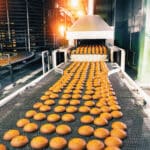While much of the “buzz” on blockchain today has focused on its uses in the cryptocurrency world, it has become a technological game-changer for the food and beverage industry from producer to consumer. When paired with the right technology, blockchain has the ability to enhance tracking, transfers, verification, and information-sharing across operations, companies, and entire supply chains – all of which can create material wins for your business.
3 Ways to Leverage Blockchain
According to Deloitte’s 2019 Global Blockchain Survey, 83% of respondents say that they see compelling use cases for blockchain in their companies. Our experts have identified three key opportunities for food and beverage manufacturers, distributors, and retailers to leverage blockchain technology:
- Answer Customer-Driven Demands for Transparency: Today’s consumers demand to know where their food comes from. Blockchain systems can give retailers indisputable information about where their food was grown, how it was made, and what certifications it complies with (i.e. Organic, Landfill-Free, etc.).
- Tackle Food Safety: Food supply chains are complex. Food products pass through multiple entities before it arrives at the grocery store, making foodborne illnesses challenging to trace and mitigate. Blockchain systems can create incontestable records that trace a food item back to the supplier, farm, field, and day of harvest – minimizing large-scale recalls and saving lives.
- Capitalize on Production Efficiencies: Every day, fresh produce, meat, and dairy products face perishability – on the farm, in storage, and at the store. When paired with sensors, blockchain can enhance monitoring for key storage and transportation requirements like temperature, packaging conditions, and expiration dates to ensure that food orders are not wasted before they reach customers.
With the right opportunity, blockchain can mitigate risk and directly impact your bottom line. But the trick is to make sure the business case – and the potential to transform outcomes – is truly there.
Contact KCoe Isom’s blockchain advisors to discuss the potential benefits that blockchain technology may have for your business.









